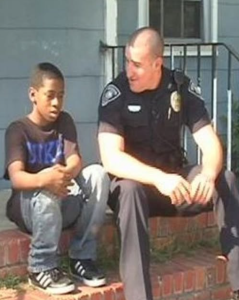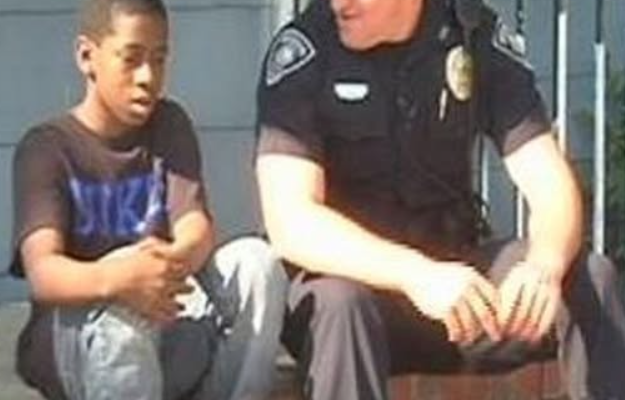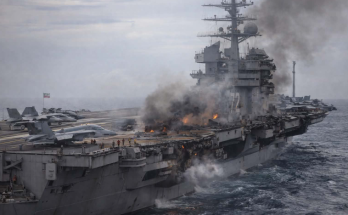
“Because I Could”: Officer Responds to Teen’s Call—and Changes His Life
It was just another shift for Corporal Kirk Keffer, patrolling the quiet streets of Benicia, California. The sun had long dipped below the horizon, and the town was settling into its nightly rhythm. Keffer had driven these roads countless times, scanning for trouble, checking in on neighborhoods, and responding to calls that ranged from mundane to urgent. But on this particular evening, something caught his eye—a lone figure walking along the shoulder of a dark road, backpack slung over one shoulder, head down, moving with quiet determination.
Keffer slowed his cruiser and pulled up beside the teenager. “You okay?” he asked, expecting perhaps a broken-down car or a missed bus. The young man looked up, startled. His name was Jourdan Duncan, and he was walking home from work—two hours each way, every day, just to earn a paycheck and save for college.
“I didn’t want to bother anyone,” Duncan explained. “I didn’t want to always call somebody and be like, ‘Hey, can you pick me up?’ That would’ve taken a lot of people’s time.”
Keffer was stunned. In a world where shortcuts and complaints were common, here was a teenager quietly grinding through hardship, not asking for help, not making excuses. He offered Duncan a ride home, and during that short drive, a bond began to form—one built not on authority or obligation, but on mutual respect and quiet admiration.
🚲 A Gesture That Spoke Volumes
The next day, Keffer couldn’t shake the conversation. Duncan’s story lingered in his mind—the long walks, the quiet perseverance, the dream of becoming a police officer himself one day. So Keffer did something unexpected: he rallied his fellow officers, pooled their money, and bought Duncan a mountain bike. Not just any bike, but one equipped with safety lights, a helmet, and all the gear needed to make his commute safer and faster.
He surprised Duncan at work with the gift. The teen was speechless. “I didn’t expect anything like this,” he said. “It’s just… wow.”
Keffer’s response was simple: “Because I could.”
Three words. No fanfare. No grand speeches. Just a quiet acknowledgment that sometimes, the most powerful thing you can do is act—because you can.
🌱 Planting Seeds of Hope
The bike was just the beginning. Keffer invited Duncan on a ride-along, giving him a glimpse into the life he hoped to lead. Duncan, whose family included several law enforcement officers, had long dreamed of wearing the badge. But he also knew the stigma—especially as a young Black man—of aligning himself with a profession often viewed with suspicion in his community.
“I want to prove that all cops aren’t bad,” Duncan said. “Which is true, because of what just happened to me.”
Their friendship deepened. Keffer became a mentor, helping Duncan navigate college applications, career planning, and the emotional complexities of pursuing a dream that straddled two worlds. Duncan, in turn, became a symbol of resilience and hope—a reminder that character isn’t defined by circumstance, but by choice.
🔥 A Story That Defies the Headlines
In a year marked by protests, police brutality, and deepening mistrust between law enforcement and communities of color, the story of Duncan and Keffer offered a rare counterpoint. It didn’t erase the pain or the systemic issues. But it reminded people that within the machinery of institutions, individuals still have the power to choose compassion.
Media outlets picked up the story. Social media lit up with praise. But for Duncan and Keffer, the attention was secondary. What mattered was the connection—the simple act of seeing each other as human beings, not stereotypes.
🧠 The Psychology of Unexpected Kindness
Why did this story resonate so deeply? Psychologists suggest that acts of unexpected kindness—especially across perceived divides—trigger a powerful emotional response. They disrupt our assumptions, challenge our biases, and invite us to imagine a different kind of world.
Keffer didn’t have to stop that night. He didn’t have to ask questions, offer a ride, or buy a bike. But he did. And in doing so, he modeled a kind of leadership that transcends rank or uniform—a leadership rooted in empathy, humility, and action.
Duncan, too, made a choice. He could have accepted the ride and moved on. But he opened up, shared his story, and allowed himself to be vulnerable. That vulnerability became the bridge between two lives that might otherwise have remained strangers.
🧩 Building a New Narrative
The phrase “Because I Could” has since become a quiet mantra for those seeking to make a difference. It’s not about grand gestures or viral fame. It’s about noticing, responding, and choosing to act—not because you have to, but because you can.
In classrooms, community centers, and police departments, Duncan’s story is now shared as a case study in relational policing, mentorship, and the power of small acts. It’s a reminder that change doesn’t always come from policy—it often begins with a conversation, a ride, a bike.
🌍 What Comes Next?
Jourdan Duncan went on to pursue college, with dreams of joining law enforcement and becoming the kind of officer who changes lives—not with force, but with kindness. Keffer continues to serve, now with a deeper understanding of the impact one moment can have.
Their story is not a solution to systemic injustice. It’s not a blueprint for reform. But it is a spark—a reminder that even in the darkest moments, light can emerge from the simplest choices.
Because we can.

